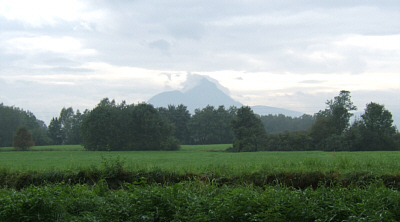Alpine Nature

Alpine Landscape
The Alps are an exceptional region be it weather, wildlife or botanic phenomenons. In this section we will show some insights, talk about special plants from flowers, bushes, moss to trees and animals.
The subjects are extensive, als the alpine region has different rock massives from high mountains to valleys and covers various European countries from France, to Italy, Switzerland, Liechtenstein, Austria, Germany and Slovenia.
Alpine Weather
Climate change in the Alps
The Alps - a paradise of flower meadows, snowy peaks, and your favourite holiday destination for hiking, skiing or for the summer?
Everyone who has learned to love the Alps in all its diversity during a visit, perhaps knows that the Alps are affected by climate change.
But did you know that this majestic mountain range reacts much more sensitive toward a changing climate and pollution than other places?
With the natural habitat of an enormous diversity of rare plants and animals the Alps offer a lot to see and a lot to protect. The ecosystem of the Alps is one of the world's most biodiverse region of our planet, but reacts very sensitively to environmental influences. All life there, is adapted to cooler temperatures and global warming is already making an impact.
The future prospects are bleak - according to the forecasts of our climate scientists there is not much time left to enjoy this exceptional space.
The global C02 emissions have been rising since 1850, mainly through the burning of fossil fuels and deforestation rigorous. A climate disaster is dawning. Freak weather as droughts followed by heavy rain, snow free winter days and heat in the summer confirm the suspicions.
Some examples of warming in the Alps: plant species in alpine regions have only a limited habitat. A temperature increase of 2 degrees is sufficient to Alpine plants. With a warming of 3 degrees in summer, the extension of all glaciers in the Alps would decline over 80% and thus be reduce to a merely 10% of the expansion in 1850. Snow safe winter sport areas whould be permanently covered with artificial snow - this requires a high technical effort and considerable energy and water needs.
What can we do?
The rethinking of each individually is in demand. Waste prevention in the Alps should be for everyone a matter of course, but how can we meet the temperature rise? Should the food we buy, really be transported around half the globe, creating enormous CO2 emissions? Does my buying a low-emission vehicle impact, even if my neighbour but rather prefers this huge vehicles, where you a least sit a half meters higher? Or is is all in all more sustainable to continue driving around with older models and therefore safing the large amount of energy and resources that are used building a new car?
Do you have any ideas? What climate protection measures do you take?
19.05.2008. 16:55

 Klicken Sie hier für die deutschsprachige Version des Magazins.
Klicken Sie hier für die deutschsprachige Version des Magazins.
 Klicken Sie hier für die deutschsprachige Version des Magazins.
Klicken Sie hier für die deutschsprachige Version des Magazins.